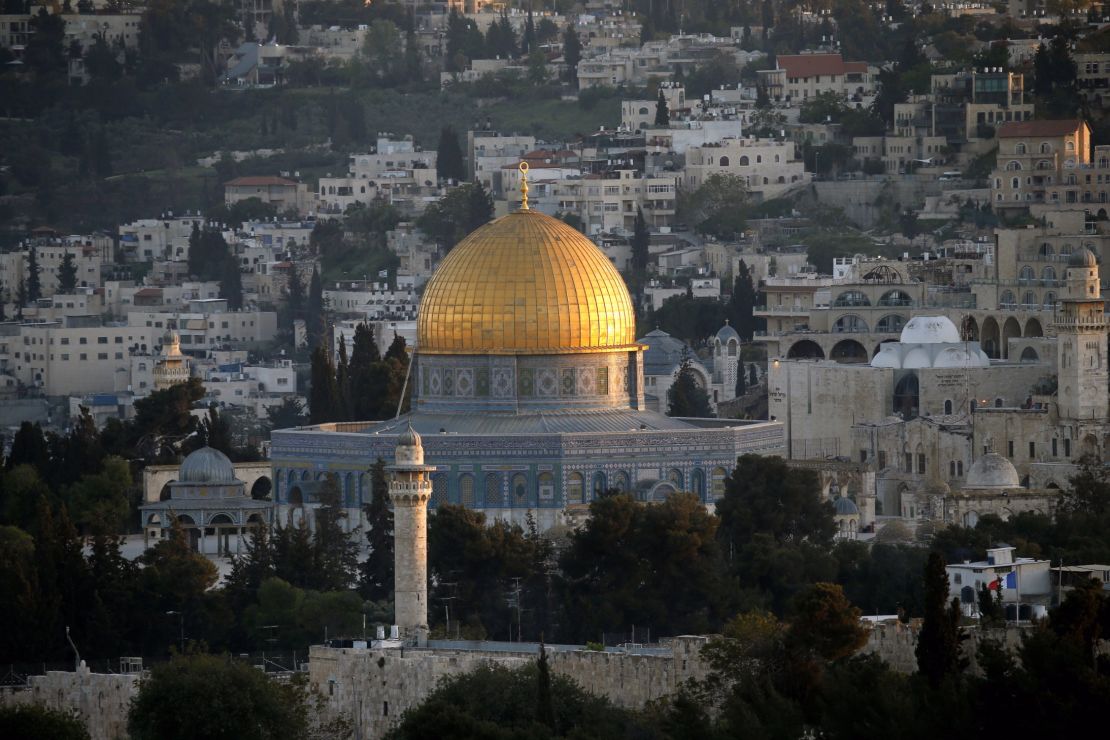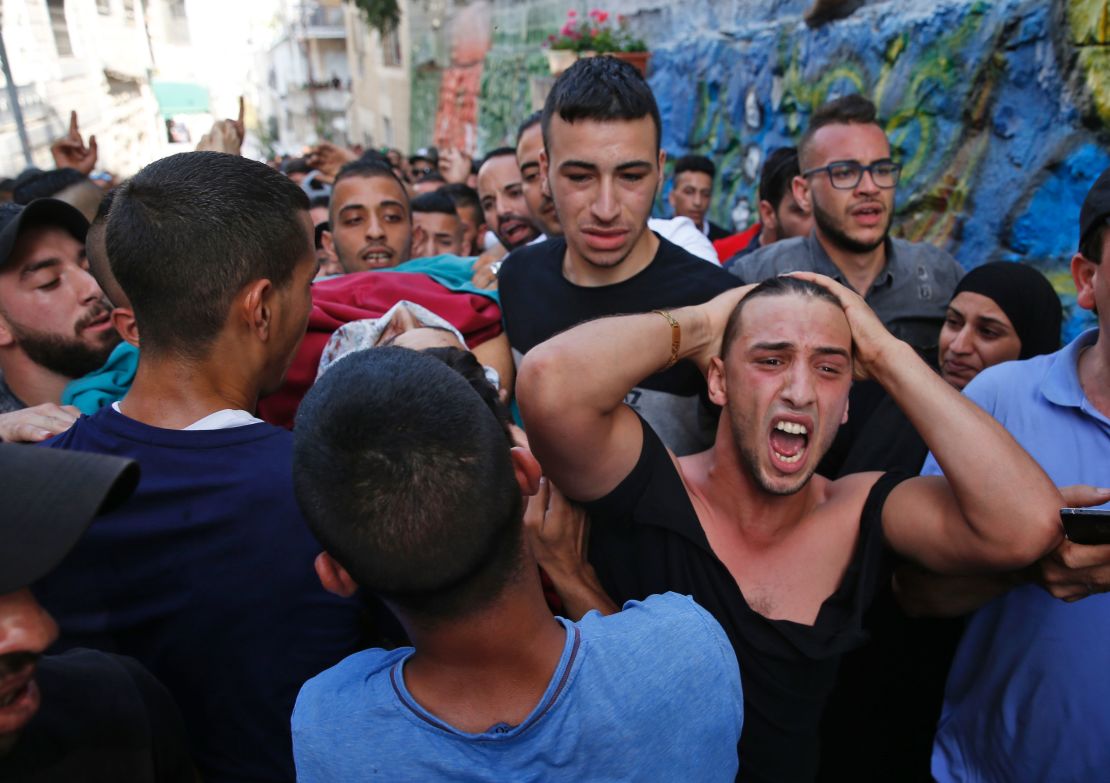Israel has installed security cameras near the entrance to one of the holiest sites in Jerusalem as tensions between Israelis and Palestinians edge higher after a violent week.
The security cameras are in addition to metal detectors placed last week at the Lion’s Gate entrance to the site, known as the Temple Mount to Jews and the Noble Sanctuary to Muslims.
The metal detectors – seen by Palestinians and Arab countries as an attempt by Israel to unilaterally exert control over the holy site – triggered widespread protests across Jerusalem and the West Bank. The added installation of security cameras is liable to spark more protests.
Israel installed the metal detectors after an attack at the site in which two Israeli police officers were killed. The metal detectors may be the immediate reason for protests that have broken out across the region; it is control of the holy site that is at the heart of this outbreak of demonstrations.
Key developments:
- Israel installed security cameras near the entrance to Old City of Jerusalem holy site early Sunday morning.
- New decisions about security measures in the Old City could be made at a Sunday night Israeli security cabinet meeting.
- Palestinian President Mahmoud Abbas suspended contact, including security coordination, between the Palestinian Authority and Israel.
- Three Israelis were killed in their home in a West Bank settlement on Friday. Police say a Palestinian man stabbed them to death.
- Four Palestinians were killed in ongoing demonstrations against Israeli security forces Friday and Saturday.
International community urges restraint
The United Nations Security Council called a meeting for Monday to discuss the latest development in the region. The Middle East Quartet, consisting of the United States, Russia, the United Nations, and European Union, issued a statement on Saturday calling on all sides “to demonstrate maximum restraint, refrain from provocative actions and work towards de-escalating the situation.” White House senior adviser Jared Kushner, President Donald Trump’s son-in-law, is leading a White House effort to address the crisis.

The Arab League has postponed its emergency meeting to address rising tensions in the West Bank and Jerusalem, the organization said on its Facebook and Twitter accounts on Sunday. The meeting, originally set for Wednesday, is to be held on Thursday.
The delay was to ensure a large number of Arab foreign ministers could participate in the meeting, according to Kuwait’s news agency KUNA.
“Jerusalem is a red line that Arabs and Muslims wouldn’t allow to be crossed,” said Arab League Chief Ahmed Aboul Gheit in a statement. “Israel is playing with fire and is risking sparking a crisis with the Arab and Muslim worlds.”
Israeli Prime Minister Benjamin Netanyahu has often touted improving relations with Sunni Muslim states in the Middle East, understood to mean Saudi Arabia, though Israel has no diplomatic relations with the Saudis.
On Sunday, Pope Francis appealed for “moderation and dialogue” at his weekly address from St. Peter’s Square at the Vatican. “I ask you to join me in prayer for the Lord to inspire in all sides proposals for reconciliation and peace,” he said.
Palestinians freeze contact with Israel
At Sunday’s weekly government meeting, Netanyahu said Israel is constantly monitoring the security situation in Jerusalem and will “decide accordingly” what actions to take. A security cabinet meeting scheduled for Sunday night could bring a new decision about the metal detectors and other security measures taken in the Old City of Jerusalem.
“We are conducting this calmly, determinedly and responsibly and thus we will continue to act in order to maintain security,” Netanyahu said.

President Abbas suspended all contacts between the Palestinian Authority and the Israeli government on Friday in protest of the metal detectors. The suspension includes the rare move of freezing security coordination, seen as a bedrock of Israeli-Palestinian relations. An Israeli military official said they are “evaluating and assessing what the declarations mean on the ground,” calling it a “complex reality.”
A violent weekend
On Sunday, a shooting at the Israeli Embassy compound in Amman left a Jordanian dead and an Israeli and a Jordanian wounded, Jordan’s Public Security Department said, according to a report by Jordan’s official Petra news agency.
The motive is unclear and there’s no evidence the incident is connected to the tensions in Jerusalem. the department said.
The department said police rushed to the scene of the incident and evacuated the three for treatment. A Jordanian was pronounced dead on arrival at a hospital.
Local media in Jordan, including one affiliated with the armed forces, are reporting heavy security presence around the embassy.
A significant percentage of Jordan’s population is of Palestinian origin and a Jordanian religious authority, the Waqf, administers the Temple Mount/Noble Sanctuary.
On Friday, thousands of Jordanians took to the streets to protest the situation in Jerusalem.
Earlier in the weekend, on Friday night, three Israelis were killed in their home in the West Bank settlement of Halamish when police say a young Palestinian man breached the settlement’s security fence and stabbed them to death. Yosef Solomon, 70, and his son, Elad, and daughter, Chaya, died in the attack. Their funerals will take place Sunday evening.
Netanyahu said Israel would look to destroy the home of the attacker as soon as possible, a routine measure intended as a deterrent against future attacks.
The Israeli military arrested more than 20 Palestinians in an overnight sweep on Sunday near the site of Friday night’s attack, according to an Israeli military official. The Palestinians were suspected of preparing attacks in the immediate future or of being members of the militant group Hamas, the official said.
Meanwhile, four Palestinians have been killed in ongoing demonstrations against Israeli security forces Friday and Saturday. On Saturday, the Palestinian Ministry of Health identified the latest Palestinian killed as Yousef Kashour, 24, from the village of el-Eizaryia.
CNN’s Sarah Sirgany, Abeer Salman, Michael Schwartz, Mohammed Najib, Kareem Khadder, Roba Alhenawi, Jomana Karadsheh and Angela Dewan contributed to this report.

